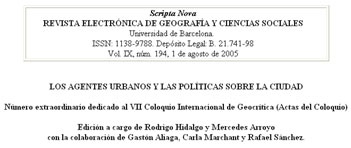The spaces of redemption in the contemporary city. Approaches to the pentecostal livening of 1909 in Valparaiso, Chile
Keywords:
utopia, religion, public spacesAbstract
In cities as Valparaiso arose, like in other third-world centers, economies of signs and spaces, characterized by an increasing absence of sense and the collectivists destruction of the subject because of the dominion of utopias and/or ideologies, of class. The development of one of these phenomena, to which we will define as the irruption of an utopia we dedicate our study; in 1909, in a city port that living a specific type of spatiality , occurs a remarkable phenomenon by its exceptional nature. A group of filigrees, originating on the low class, lives a experience that it impels to him to generate a significant change in his lives from which calls feel to generate the conditions so that the Kingdom bursts in into its city of Earth God, which supposes of step, to imagine (actively trying to obtain) a new city consolidated from the utopia and naturally different from that in which until that day they grew and they lived. We will try to search, from the paradigm of the critical geography, that city imagined, what problems perceived in that large city and that society in which they lived and how that space now a scene of battle to stand out on any other problem and to be able that that they considered like originating of God; it appeared in the social scene a new tipology of being able, so little and specific as all, the power of God, which since it settles is able to construct and/or to reconstruct "skies new and new earth", spaces of hope and new dimensions of personal and social change. The space and the conceptions, ideologies and perceptions to him associates, will be defined, emulating to the title of a text written by David Harvey, like a hope space.Downloads
Published
2007-06-09
Issue
Section
Articles
License
Los autores que publican en esta revista están de acuerdo con los siguientes términos:
- Los autores conservan los derechos de autoría y otorgan a la revista el derecho de primera publicación, cin la obra disponible simultáneamente bajo una Licéncia de Atribución Compartir igual de Creative Commons que permite compartir la obra con terceros, siempre que estos reconozcan la autoría y la publicación inicial en esta revista.
- Los autores son libres de realizar acuerdos contractuales adicionales independientes para la distribución no exclusiva de la versió de la obra publicada en la revista (com por ejemplo la publicación en un repositorio institucional o en un libro), siempre que se reconozca la publicación inicial en esta revista.





